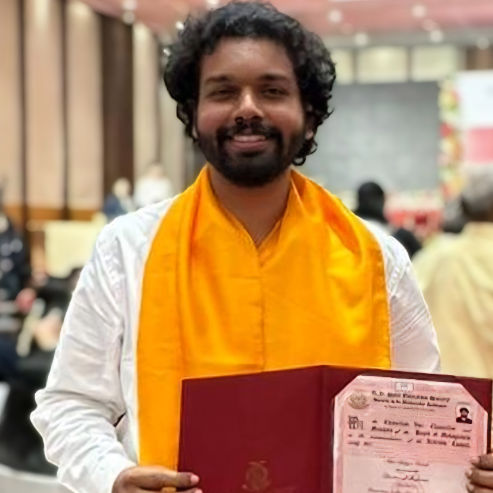Welcome User
Relevance
Consult Psychiatrists Online (194 doctors)

Dr. Sarath Bodepudi
Psychiatrist
11 Years • M.B.B.S, M.D. (Psychiatry)
Visakhapatnam
Apollo 24|7 Clinic - Andhra Pradesh, Visakhapatnam

Dr. Vunnam Shashanka
Psychiatrist
9 Years • MBBS, MD (Psychiatry)
Visakhapatnam
Apollo 24|7 Clinic - Andhra Pradesh, Visakhapatnam

Dr. Dinesh Reddy Panati
Psychiatrist
13 Years • MBBS, MD (Psychiatry)
Visakhapatnam
Apollo 24|7 Clinic - Andhra Pradesh, Visakhapatnam

Dr. Debdatta Pati
Psychiatrist
18 Years • MBBS, DPM, MD (PSYCHIATRY)
Kolkata
MCR SUPER SPECIALITY POLY CLINIC & PATHOLOGY, Kolkata

Dr. Vivek Pathak
Psychiatrist
15 Years • MBBS, MD (Psychiatry)
Noida
𝗗𝗿 𝗞𝗨𝗠𝗔𝗥'𝗦 𝗙𝗔𝗠𝗜𝗟𝗬 𝗖𝗟𝗜𝗡𝗜𝗖 𝗮𝗻𝗱 𝗩𝗔𝗖𝗖𝗜𝗡𝗔𝗧𝗜𝗢𝗡, Noida
(25+ Patients)

Dr Rohit Ranjan
Psychiatrist
10 Years • MBBS, MD (Psychiatry)
Bengaluru
Apollo Medical Center, Marathahalli, Bengaluru
(25+ Patients)

Dr Harish K S
Psychiatrist
6 Years • MBBS, MD Pychaitrist
Bengaluru
Apollo Clinic, JP nagar, Bengaluru

Dr. Sowmya G N
Psychiatrist
5 Years • MBBS,DNB,DPM
Bengaluru
Apollo Clinic, JP nagar, Bengaluru

Dr. Sudharani Puru Naik
Psychiatrist
3 Years • MBBS, MD (PSYCHIATRY )
Mysuru
Apollo Clinic, Mysore, Mysuru

Dr. Bobiya James
Psychiatrist
4 Years • MBBS, D P M PSYCHIATRY
Bengaluru
Apollo Clinic, Electronic City, Bengaluru

Dr. Kamal Kishore Verma
Psychiatrist
15 Years • MBBS, MD (SPM), DNB (Psychiatry)
Mathura
PEACEFUL MIND CLINIC, Mathura
(50+ Patients)

Dr. Satrajit Ghosal
Psychiatrist
8 Years • MBBS,MD(PSYCHIATRY)
Howrah
LILA HEALTH POINT, Howrah

Dr. Anweshan Ghosh
Psychiatrist
10 Years • MBBS MD Psychiatry
Barasat
Diab-Eat-Ease, Barasat

Dr. Aditya Nair
Psychiatrist
5 Years • MBBS, MD (Psychiatry)
Bansdroni
Siddhita Healthcare., Bansdroni

Dr. Bhargav Sirivelu
Psychiatrist
8 Years • MBBS, MD ( Psychiatry)
Chennai
Apollo Hospitals Greams Road, Chennai
(625+ Patients)
Psychiatry
Booking a consultation with a psychiatrist is now easier than ever with Apollo 24|7. Our platform offers convenient access to top psychiatrists near you, allowing you to schedule an appointment at a trusted hospital or clinic that suits your needs. With flexible appointment slots and the option for online consultations, you can receive expert care from the comfort of your home. Our experienced psychiatrists provide comprehensive evaluations, personalised treatment plans, and support to help you manage your mental health effectively. Take the first step towards better mental well-being by booking a psychiatrist consultation with Apollo 24|7 today.
What is Psychiatry?
Psychiatry is a medical speciality dedicated to the diagnosis, prevention, and treatment of mental disorders. This field encompasses a wide range of mood, behaviour, cognition, and perceptual abnormalities. Psychiatrist doctors focus primarily on the interaction of both mental and physical aspects of psychological problems.
The relevance of psychiatry in healthcare is profound as it addresses the complex relationship between the mind and body, ensuring holistic patient wellness. This specialty is pivotal in healthcare for its role in treating mental health issues, which can be as critical as physical health ailments, affecting overall life quality and functionality.
Who is a Psychiatrist?
A psychiatrist is a medical doctor specialising in mental health, including substance use disorders. Psychiatrists are qualified to assess both the mental and physical aspects of psychological problems.
To become a psychiatrist, an individual must complete medical school followed by a residency in psychiatry. These professionals are adept at managing a wide array of conditions, from depression and anxiety to schizophrenia and bipolar disorder.
Psychiatrists can prescribe medications, conduct psychotherapy, and provide various treatments that are essential for managing and mitigating mental health disorders. Their training and expertise make them uniquely equipped to understand the complex interplay between the mind and the body.
What Does a Psychiatrist Do?
A psychiatrist, often referred to as a mental health doctor, plays a crucial role in diagnosing, treating, and managing mental illnesses. Their responsibilities are diverse, ranging from patient assessments to the execution of comprehensive treatment plans.
Key responsibilities and daily activities include:
1.Diagnosis and Assessment:
Conduct thorough psychiatric evaluations, including mental status examinations and medical histories.
Utilise diagnostic tools and criteria to identify psychiatric disorders.
2.Treatment Planning and Management:
Develop and manage tailored treatment plans that may include medication, psychotherapy, and other therapeutic interventions.
Adjust treatments based on patient progress and evolving needs.
3.Medication Management:
Prescribe and monitor psychiatric medication to manage symptoms effectively.
Educate patients about medication effects, potential side effects, and interaction with other drugs.
4.Psychotherapy:
Provide various forms of psychotherapy, such as cognitive-behavioural therapy (CBT), interpersonal therapy, or psychodynamic therapy, tailored to the patient's condition.
Address emotional, behavioural, and mental issues through structured sessions.
5.Multidisciplinary Collaboration:
Work closely with other healthcare professionals, including psychologists, general practitioners, and social workers, to provide holistic care.
Participate in multidisciplinary team meetings to discuss and optimise patient care plans.
6.Specialist Roles:
Neuropsychiatrists focus specifically on the intersection of neurological and psychiatric disorders, often dealing with complex cases that involve brain injuries or neurodegenerative diseases.
7.Patient Education and Advocacy:
Educate patients and their families about mental health conditions and the importance of ongoing treatment.
Advocate for patient rights and access to necessary healthcare resources.
The day-to-day life of a psychiatrist involves a blend of clinical and therapeutic tasks, all geared towards improving the mental health and overall well-being of their patients.
What are the Other Sub-specialities of Psychiatry?
Psychiatry encompasses a variety of sub-specialities, each focusing on different age groups, specific conditions, or unique settings. Here’s an overview of the major sub-specialities within psychiatry:
Child and Adolescent Psychiatry: Focuses on diagnosing and treating mental disorders in children and teenagers. This sub-speciality addresses issues ranging from developmental disorders to mood and anxiety disorders affecting younger populations.
Geriatric Psychiatry: Specialises in the mental wellbeing of the elderly, often dealing with neurocognitive disorders such as dementia, depression, and anxiety that occur later in life.
Forensic Psychiatry: Involves the intersection of mental health and the law, providing assessments, diagnoses, and treatments of individuals involved in legal cases, often determining issues of competency and providing expert testimony in court cases.
Addiction Psychiatry: Dedicated to the evaluation and treatment of individuals with alcohol, drug, or other substance-related disorders, as well as other addictive behaviours.
Neuropsychiatry: A field at the crossroads of neurology and psychiatry, focusing on psychiatric disorders with a neurological basis such as traumatic brain injuries and neurodegenerative diseases.
Psychosomatic Medicine: Also known as consultation-liaison psychiatry, this sub-speciality deals with the psychiatric care of patients suffering from chronic medical conditions and those who require complex management for their psychiatric symptoms alongside other medical illnesses.
Emergency Psychiatry: Focuses on the assessment and treatment of acutely disturbed individuals. Professionals in this field work in emergency settings, often dealing with crises such as suicide attempts or severe psychological distress.
Military Psychiatry: Concentrates on the mental health of military personnel and veterans, addressing issues from post-traumatic stress disorder to depression that may arise from military service.
Community Psychiatry: Involves the treatment, prevention, and rehabilitation of patients within community settings rather than in-patient settings, aiming to reduce the incidence of mental health issues across populations.
Consultation-Liaison Psychiatry: Psychiatrists in this field work in hospital settings, bridging the gap between psychiatry and other medical fields to help diagnose and manage psychiatric symptoms in medically ill patients.
Sleep Medicine: Focuses on diagnosing and treating sleep disturbances and disorders which are often associated with psychiatric conditions like depression and anxiety.
Pain Psychiatry: Deals with the assessment and treatment of pain that has a significant psychological component, often working alongside other specialists to manage pain holistically.
Women’s Mental Health: Specialises in the mental health issues specific to women, including postpartum depression, hormonal imbalances, and other psychiatric disorders influenced by reproductive health.
Each sub-speciality plays a vital role in expanding the scope of psychiatric care, offering specialised treatment tailored to the needs of various groups and individual circumstances.
What are the Psychiatry Examinations or Tests Performed by the Psychiatrist?
Psychiatrists utilise a variety of diagnostic tests and examinations to accurately assess and diagnose mental health conditions. These methods are critical for developing effective treatment plans. Here are the most commonly employed diagnostic tools and techniques in the field of psychiatry:
Psychiatric Evaluation: This comprehensive assessment involves a detailed interview with the patient to gather information about their current symptoms, medical history, family history of mental health issues, and overall lifestyle. It aims to identify the psychological, biological, and social factors contributing to the patient's condition.
Mental Status Examination (MSE): During this evaluation, the psychiatrist observes and notes the patient's appearance, behaviour, mood, and cognitive functions such as memory and concentration. This helps in assessing the current mental state and identifying any disturbances.
Psychological Testing: Various standardised tests may be used to measure specific aspects of a person's psychological health, such as IQ, memory, executive functions, and presence of mood or anxiety disorders.
Neuropsychological Tests: These are specific tests conducted to assess any cognitive impairments that may be due to neurological disorders. They help differentiate psychiatric conditions from neurological conditions.
Brain Imaging: Techniques such as MRI and CT scans are occasionally used to rule out neurological conditions. PET scans can also be employed to study brain activity and detect abnormalities.
Blood Tests: While not diagnostic for most psychiatric disorders, blood tests can help rule out physical conditions that might mimic or influence psychiatric symptoms, such as thyroid dysfunction or vitamin deficiencies.
Rating Scales and Questionnaires: These tools are used to evaluate the severity of symptoms across various mental health disorders and can be useful for both initial assessment and follow-up to gauge treatment effectiveness.
Psychotherapy Sessions: While primarily therapeutic, sessions with a psychotherapist also provide key insights through clinical observation and patient discussions, contributing to diagnostic conclusions and ongoing adjustments to treatment plans.
Together, these examinations form a foundation for psychiatrists to diagnose accurately and manage effectively the mental health conditions of their patients, ensuring tailored and effective interventions.
What are the Common Conditions & Diseases that Psychiatrists Treat?
A mental health specialist, is trained to treat a wide range of mental health conditions. Here are the top 15 conditions they commonly manage, listed in decreasing order of commonality:
Depression: Characterised by persistent sadness, loss of interest in enjoyable activities, and a range of emotional and physical problems, significantly impairing a person's daily life.
Anxiety Disorders: Includes generalised anxiety disorder, panic disorder, and social anxiety disorder, which involve excessive fear or worry affecting daily activities.
Bipolar Disorder: A disorder associated with episodes of mood swings ranging from depressive lows to manic highs.
Schizophrenia: A serious mental disorder in which people interpret reality abnormally, potentially resulting in some combination of hallucinations, delusions, and extremely disordered thinking and behaviour.
Post-Traumatic Stress Disorder (PTSD): A condition triggered by experiencing or witnessing a terrifying event, causing severe anxiety, flashbacks, and uncontrollable thoughts about the event.
Obsessive-Compulsive Disorder (OCD): Involves unwanted recurrent thoughts (obsessions) and/or repetitive behaviours (compulsions) which the person feels driven to perform.
Personality Disorders: A group of mental illnesses characterised by enduring maladaptive patterns of behaviour, cognition, and inner experience, exhibited across many contexts and deviating from those accepted by the individual’s culture.
Eating Disorders: Includes anorexia nervosa, bulimia nervosa, and binge-eating disorder, involving severe disturbances in eating behaviours and related thoughts and emotions.
Addiction and Substance Abuse Disorders: Involves the abuse of substances like alcohol, opioids, and drugs, leading to significant impairment or distress.
Attention Deficit Hyperactivity Disorder (ADHD): Marked by an ongoing pattern of inattention and/or hyperactivity-impulsivity that interferes with functioning or development.
Autism Spectrum Disorders (ASD): A range of conditions characterised by some degree of impaired social behaviour, communication, and language, and a narrow range of interests and activities that are both unique to the individual and carried out repetitively.
Dementia: Involves a decline in memory or other thinking skills severe enough to reduce a person's ability to perform everyday activities, often seen in the elderly.
Sleep Disorders: Includes conditions such as insomnia, sleep apnea, narcolepsy, and restless legs syndrome that significantly affect sleep.
Somatoform Disorders: Conditions in which patients experience physical symptoms in the absence of a clear physical cause, such as pain disorder or hypochondriasis.
Borderline Personality Disorder (BPD): A serious mental disorder marked by a pattern of ongoing instability in moods, behaviour, self-image, and functioning.
These conditions represent a broad spectrum of mental health issues that psychiatrists are equipped to manage, helping to alleviate symptoms and improve the quality of life for their patients.
Reasons to See a Psychiatrist
Seeing a psychiatrist is crucial if you experience mental health issues that affect your daily life or emotional well-being. Psychiatrists can diagnose, manage, and treat a variety of mental health conditions, offering support and strategies for recovery.
Here are the primary reason for a psychiatrist consultation:
Persistent Mood Changes: Unusual or prolonged bouts of sadness, irritability, or euphoria.
Anxiety and Fear: Excessive worries that interfere with daily activities.
Behavioural Changes: Noticeable shifts in behaviour or personality.
Cognitive Difficulties: Problems with concentration, memory, or logical thinking.
Substance Use: Issues with alcohol or drug use that impact health and relationships.
Trauma Response: Ongoing psychological distress following a traumatic event.
Thoughts of Self-harm: Any thoughts or actions towards self-injury or suicide.
A psychiatrist's expertise is vital in addressing these issues, providing a path to better mental health.
What Types of Procedures do Psychiatrists Perform?
Psychiatrists perform a range of therapeutic procedures and, less commonly, some minor surgical interventions. Here’s a breakdown of the top therapies and surgical techniques they use:
Top Therapies:
Cognitive Behavioural Therapy (CBT): A structured, time-limited therapy that aims to change patterns of thinking or behaviour that are behind people's difficulties, and so change the way they feel.
Psychoanalysis: Involves regular sessions that explore thoughts, desires, and dreams to uncover deep-rooted feelings and resolve repressed issues.
Interpersonal Therapy (IPT): Focuses on interpersonal relationships and social functioning to help improve communication patterns and increase self-esteem.
Medication Management: Involves prescribing and adjusting psychiatric medication as a means to manage symptoms effectively.
Electroconvulsive Therapy (ECT): Used primarily for severe depression, involving electrical stimulation of the brain under anaesthesia to produce controlled seizures.
Dialectical Behaviour Therapy (DBT): A comprehensive cognitive-behavioural treatment that focuses on managing emotions and improving relationships through mindfulness.
Group Therapy: Facilitates therapeutic sessions with groups to provide support, improve social skills, and address common issues such as substance abuse or grief.
Family Therapy: Involves treating more than one member of the family at the same time to help improve communication and resolve conflicts.
Behavioural Activation: Focuses on activities that are rewarding to overcome patterns of avoidance, withdrawal, and inactivity often found in depression.
Psychodynamic Therapy: Emphasises understanding the issues that motivate and influence a person's behaviour, thoughts, and feelings.
Mindfulness-Based Cognitive Therapy (MBCT): Combines cognitive therapy techniques with mindfulness strategies.
Crisis Intervention: Short-term help to individuals experiencing a mental health crisis to prevent worsening of their condition or to help them return to their normal functioning.
Supportive Psychotherapy: Aims to reinforce a person’s ability to cope with stressors through encouragement and improving self-esteem.
Assertive Community Treatment (ACT): Intensive team-based treatment for individuals with severe mental illnesses predominantly living in community settings.
Art Therapy: Uses the creative process of art making to improve mental health and emotional well-being.
Surgical Procedures: While not commonly associated with psychiatry, some minor invasive procedures include:
Vagus Nerve Stimulation (VNS): Involves implanting a device that stimulates the vagus nerve with electrical impulses.
Transcranial Magnetic Stimulation (TMS): A noninvasive procedure that uses magnetic fields to stimulate nerve cells in the brain to improve symptoms of depression.
These therapies and procedures highlight the extensive toolkit psychiatrists have to address diverse mental health conditions, each tailored to meet the specific needs of the patient. If you're considering seeking help, you can easily book psychiatrist online to start your journey toward better mental health.
Why Choose an Apollo 24|7 Psychiatrist?
Apollo 24|7 psychiatrists are highly skilled and experienced in providing comprehensive mental healthcare. With their expertise and qualifications, they offer personalised treatment plans tailored to each patient's unique needs. Patients can access a wide range of advanced treatment options, including medication management, psychotherapy, and neuromodulation techniques.
One of the key advantages of choosing an Apollo 24|7 psychiatrist is the seamless access to care. Patients can easily book appointments through the website or mobile application, allowing for convenient scheduling of online consultations or in-clinic visits. The platform also enables patients to see psychiatrist reviews and ratings, helping them make informed decisions about their mental healthcare provider.
Apollo 24|7 psychiatrists prioritise patient comfort and confidentiality, creating a safe and supportive environment for discussing mental health concerns. With their commitment to delivering high-quality care and utilising the latest advancements in psychiatric treatment, Apollo 24|7 psychiatrists are well-equipped to help patients achieve optimal mental well-being.
What to Expect When Visiting a Psychiatrist?
Visiting a psychiatrist for the first time can be a significant step towards understanding and managing your mental health. When searching for a psychiatrist near me, it’s important to know what to expect during your visit, which typically includes assessments, consultations, and discussions about potential treatment plans.
Here is what to expect:
Initial Consultation: The first session involves a detailed discussion about your health history, symptoms, and any concerns you might have.
Mental Health Assessment: Expect a thorough assessment, including questions about your emotional state, thoughts, and behaviour patterns to accurately diagnose any mental health conditions.
Treatment Discussion: Based on the assessment, the psychiatrist will discuss potential treatment options with you, which may include medication, therapy, or a combination of both.
Confidentiality: Everything you discuss is confidential, providing a safe space to speak openly about your feelings and experiences.
Follow-up Appointments: Regular follow-ups will be scheduled to monitor progress and adjust treatments as necessary.
Understanding these steps can help you feel more prepared and comfortable with the process of receiving psychiatric care.
How Can I Get an Appointment With a Psychiatrist?
Booking an appointment with a psychiatrist is a simple process, and there are several options available to help you access the care you need:
Online Booking: Visit the Apollo 24|7 website and navigate to the "Book Appointment" section. Select "Psychiatry" as the specialty and choose a psychiatrist based on their profile, availability, and psychiatrist fee. Follow the prompts to select a date and time that suits your schedule and complete the booking process.
Mobile Application: Download the Apollo 24|7 mobile app from the App Store or Google Play Store. Log in or create an account, and select the "Book Appointment" option. Choose "Psychiatry" as the specialty and browse through the list of available psychiatrists. Select your preferred doctor, date, and time, and confirm your appointment.
Offline Booking: You can also book an appointment by calling the Apollo 24|7 helpline or visiting your nearest Apollo Hospital or clinic. Provide the customer service representative with your preferred date, time, and psychiatrist, and they will assist you in scheduling the appointment.
Referrals: If you have been referred to a psychiatrist by your primary care physician or another healthcare provider, you can contact the psychiatrist's office directly to schedule an appointment. Be sure to mention the referral and provide any necessary documentation.
FAQs
Is a psychiatrist a MBBS doctor?
Yes, a psychiatrist is a MBBS (Bachelor of Medicine, Bachelor of Surgery) doctor. They undergo medical school training, earning a MBBS degree, followed by specialised training in psychiatry during their residency.
Who earns more, a psychologist or a psychiatrist?
A psychiatrist typically earns more than a psychologist. This is because psychiatrists are medical doctors who can prescribe medication and their training is longer and more medically oriented.
What is the highest degree a psychiatrist earns?
The highest degree a psychiatrist can earn is a Doctor of Medicine (MD) in Psychiatry. Some may also pursue further specialisations with fellowships in areas such as child and adolescent psychiatry, forensic psychiatry, or geriatric psychiatry.
How to become a psychiatrist after 12th?
To become a psychiatrist after the 12th grade, you must first complete a MBBS degree from a recognised medical college, followed by a postgraduate residency program in psychiatry, which typically lasts for about three years.
What conditions do psychiatrists commonly treat?
Psychiatrists treat a wide range of mental health conditions, including:
- Anxiety disorders
- Mood disorders (e.g., depression, bipolar disorder)
- Psychotic disorders (e.g., schizophrenia)
- Eating disorders
- Post-traumatic stress disorder (PTSD)
- Substance use disorders
What are the benefits of early intervention in mental health?
Early intervention in mental health can be crucial in preventing serious illnesses, minimising or delaying symptoms, preventing hospitalisation, and improving prognosis. Addressing early warning signs, even if they do not yet indicate a diagnosable mental illness, can help prevent the development of more severe mental health problems.
How can someone know if they need to see a psychiatrist?
If someone experiences significant changes in mood, personality, sleeping patterns, overwhelming fear and anxiety, or severe mental health issues like suicidal thoughts or intent to harm others, they should seek immediate attention from a mental health professional. Other signs include disruptions in daily functioning, such as problems at work, school, or in social relationships.
What can I expect during my first psychiatrist consultation?
During the initial psychiatrist consultation, the psychiatrist will ask about your background, family history, habits, general health, and reasons for seeking treatment. This interview helps the psychiatrist understand your situation and develop a personalised treatment plan. They may also conduct a physical examination and order laboratory tests if necessary.
How often will I need to see my psychiatrist?
The frequency of visits depends on the individual treatment plan. Patients on long-term medication will need periodic meetings with their psychiatrist to monitor the effectiveness and potential side effects of the medication. Psychotherapy sessions can vary from a few sessions over a short period to many sessions spanning several years, depending on the patient's needs.
How can I find a good psychiatrist near me?
To find a good psychiatrist near me, consider the following:
Ask for referrals from your general practitioner, family, or friends
Check with your insurance provider for covered mental health professionals
Search online directories or databases of licensed psychiatrists
Read psychiatrist reviews and ratings from previous patients
Consider the psychiatrist's specialisations and areas of expertise to ensure they match your needs